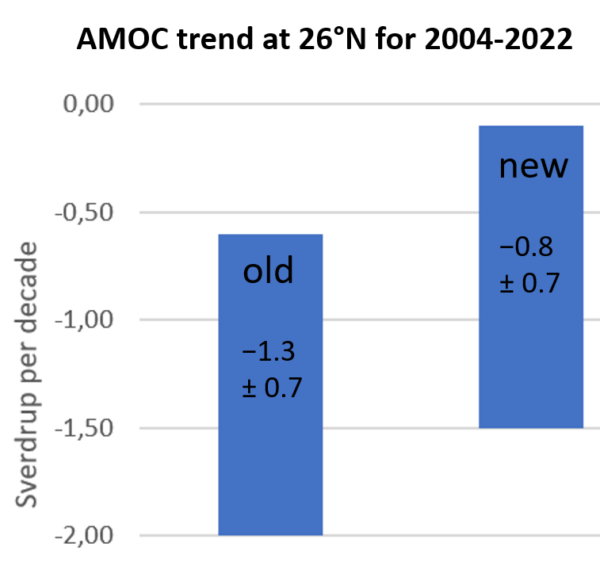This month’s open thread for climate topics. Please try to stay focused on climate instead of generic (and tedious) political sniping.
Blog – realclimate.org – All Posts
WMO: Update on 2023/4 Anomalies
The WMO released its (now) annual state of the climate report this week. As well as the (now) standard set of graphs related to increasing greenhouse gas concentrations, rising temperatures, reducing glacier mass, etc., Zeke Hausfather and I wrote up a short synthesis on the contributions to recent temperature anomalies.
[Read more…] about WMO: Update on 2023/4 AnomaliesAndean glaciers have shrunk more than ever before in the entire Holocene
Glaciers are important indicators of climate change. A recent study published in the leading journal Science shows that glaciers in the tropical Andes have now retreated further than at any other time in the entire Holocene – which covers the whole history of human civilisation since the invention of agriculture. These findings are likely to resonate beyond the scientific community, as they strongly support the lawsuit filed by a Peruvian farmer against the energy company RWE, which has returned to court this week.
Paleoclimatologists can determine how long bedrock beneath a glacier has been covered by ice using measurements of specific isotopes. When rock surfaces are exposed, isotopes such as carbon-14 and beryllium-10 form due to bombardment by cosmic radiation. If, however, the rock is covered by an ice sheet, it is shielded from this radiation, and these unstable isotopes gradually disappear through radioactive decay (with half-lives of 5,700 and 1.4 million years, respectively). This method, known as cosmogenic radionuclide dating, has been well-established for decades. I first encountered it myself 23 years ago during an excursion with glacier experts to New Zealand’s Southern Alps.
The new study applied this method to examine several glaciers in the tropical Andes (see Fig. 1).
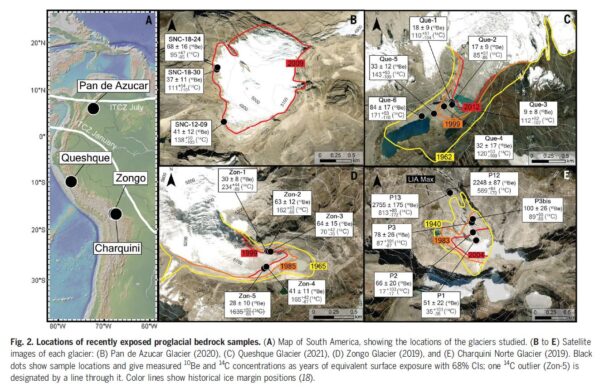
In rock samples collected at the edges of the glaciers, researchers found isotope concentrations close to zero. From this, they conclude that these rocks must have remained covered by ice throughout the entire Holocene, shielding them from cosmic radiation. This indicates that these glaciers are very likely smaller today than at any point in at least the last 11,700 years.
This finding aligns with several previous studies showing that temperatures in the tropical Andes have never been warmer during the Holocene than they are today. For instance, reconstructions of the glacier margin of the Quelccaya Ice Cap demonstrate that it has not been smaller than today at any time in at least the last 7,000 years. Temperature reconstructions based on proxy data further support this conclusion.
Global Warming Means Global Glacier Retreat
The Andes are not an exception: according to current research, global average temperatures today are very likely higher than at any other point during the entire Holocene. Given that an ice age lasted for more than 100,000 years before the Holocene, today’s temperatures are probably the highest experienced in about 120,000 years. This unprecedented warming, which began in the 19th century and has so far reached around 1.3–1.4°C, is almost entirely driven by human activity – primarily the burning of fossil fuels. According to the Intergovernmental Panel on Climate Change (IPCC), natural factors have contributed very little to recent warming, probably even having a slightly cooling effect, due to declining solar activity since the mid-20th century (a fact reflected in the title of former RWE manager Fritz Vahrenholt’s book, Die kalte Sonne – The Cold Sun).
As a result, glaciers worldwide continue to lose mass (see Figure 2). In Germany, only four glaciers remain, following the disappearance of the Southern Schneeferner glacier in September 2022. Soon, there will be no glaciers left in Germany at all.
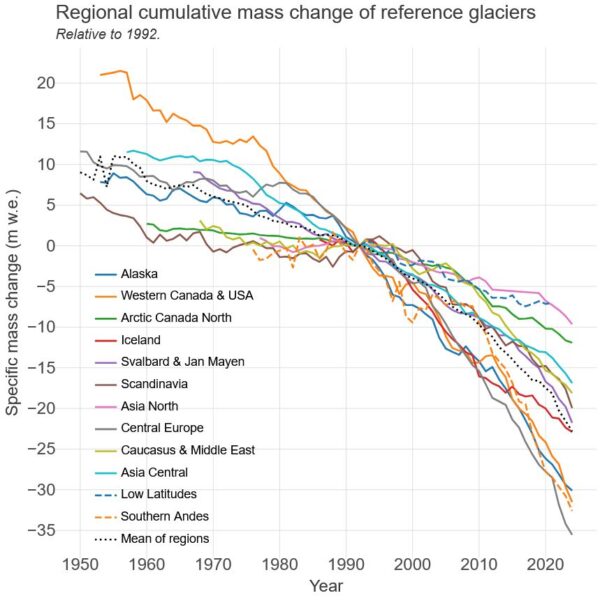
Implications for the RWE Case
The RWE case addresses, among other things, whether global warming caused by CO₂ emissions is responsible for the severe glacier melt, the substantial retreat of the glacier by approximately 1.5 km over the past 140 years and the thawing of permafrost above the city of Huaraz in Peru. A 2021 attribution study published in the respected journal Nature Geoscience has already conclusively demonstrated this connection; however, RWE appears to continue challenging these findings.
In this context, the new data from Gorin et al. are particularly relevant. The Queshque Glacier, now smaller than at any other time in at least the last 11,700 years, is located only 40 km from Huaraz, in the same mountain range as Lake Palcacocha (see Fig. 3).
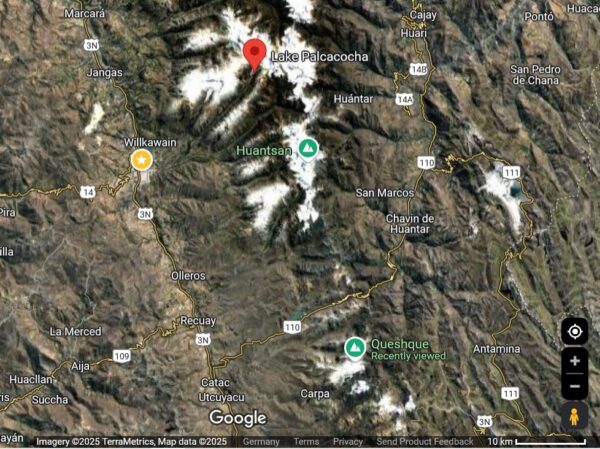
It is highly likely that local climate changes across this area differ minimally at most. Although average climate conditions can vary over short distances due to local topography, climate warming typically has a correlation radius of more than 1,000 km. Therefore, there is no meaningful difference in climate change effects between Queshque Glacier and Lake Palcacocha.
This region is already experiencing the most significant climate warming in the history of human civilisation. It will undoubtedly continue until the global economy achieves climate neutrality, essentially, net-zero CO₂ emissions.
In the RWE trial, the central issue will be whether, and to what extent, the city of Huaraz and the plaintiff would be affected by a glacier flood. A systematic analysis of past glacial lake outburst floods (GLOFs) in the region has examined 160 such events based on satellite imagery. The findings clearly identify the Andes around Huaraz as a hotspot for this risk (see Fig. 4).
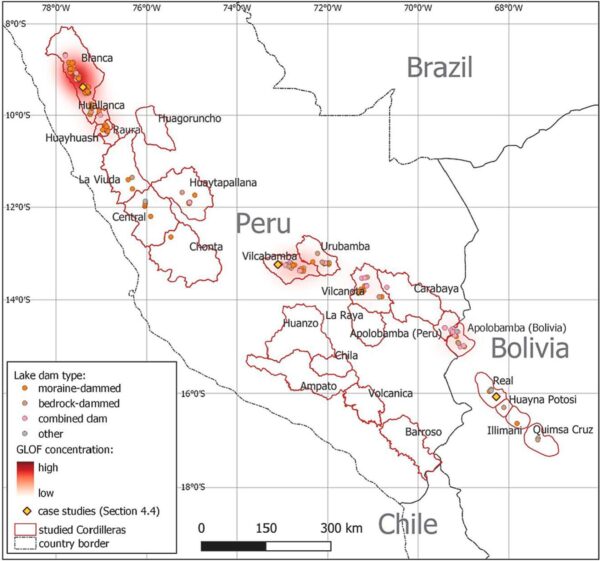
Huaraz is located at 9.5° south latitude within the high-risk zone marked in red. Source: Emmer et al. 2022.
Additionally, this study shows that the frequency of such floods has increased significantly since 1980 (see Fig. 5). Before 1980, there was only one year with more than two recorded GLOFs: 1970 due to a severe earthquake. However, there are now repeatedly years with 3, 4 or even 5 glacial lake outbursts.
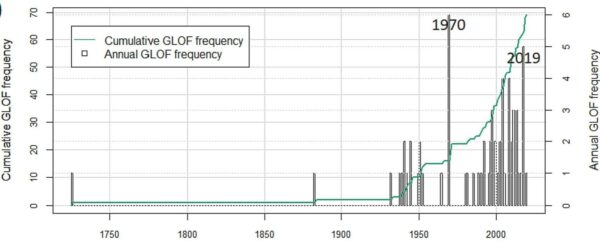
One thing is clear: given the existing research, it would be absurd to assume that the risk of a Lake Palcacocha outburst could be calculated based solely on historical data, without explicitly accounting for global warming caused by fossil fuels. Anyone who suggests that climate change is not happening in Huaraz – that there is no human fingerprint, and therefore no connection to RWE’s share of CO₂ emissions – may have their reasons for doing so. But the evidence clearly shows otherwise.
Climate change in Africa
While there have been some recent set-backs within science and climate research and disturbing news about NOAA, there is also continuing efforts on responding to climate change. During my travels to Mozambique and Ghana, I could sense a real appreciation for knowledge, and an eagerness to learn how to calculate risks connected to climate change.
[Read more…] about Climate change in AfricaWe need NOAA now more than ever
Guest commentary by Robert Hart, Kerry Emanuel, & Lance Bosart
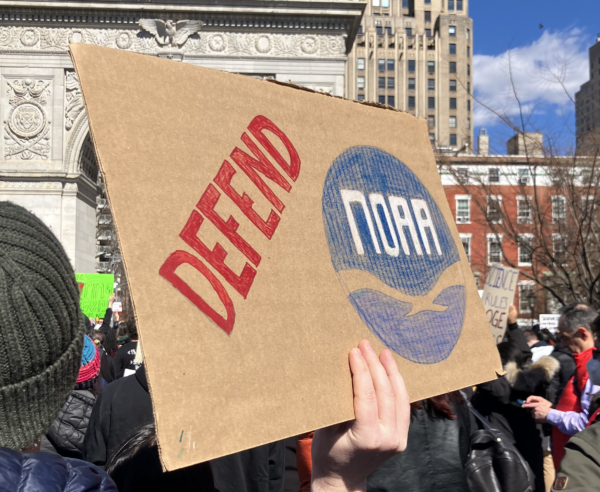
The National Weather Service (NWS) and its parent agency, the National Oceanic and Atmospheric
Administration (NOAA), delivers remarkable value to the taxpayers. This efficiency can be demonstrated by its enormous return on investment. For example, the NWS costs only several dollars per citizen to operate each year, yet results in an estimated 10-100 times larger financial return that includes: improved citizen preparedness, improved transportation efficiency and safety, increased private sector profits, improved disaster prevention and mitigation, and impressive scientific research innovation that is significantly also contributed to by other related federal agencies, the private sector, and the academic research community.
Recent NWS initiatives have even more directly connected weather and ocean observations and forecasts to emergency preparation and public impact. To quote a 2019 study referenced below, “Partnership with the NWS has revolutionized this Emergency Management community from on that reacts to events to one that proactively prepares and stays ahead of the extreme events.” The societal benefits of reasonably predicting the future cannot be understated, and such prediction and resulting benefits were unimaginable only 75 years ago.
Critical taxpayer-funded investments over the past decades have led to greatly improved weather forecast models, observations from the ocean, ground, aircraft, and space, and theoretical understanding through scientific research. These all have had an enormous impact on lives and property. The forecasts and associated critical watches and warnings we see every day on television, the internet, or phone apps could not be possible without NOAA and the NWS. It is estimated that the tax revenue generated from the private sector using NOAA data and services easily pays for the entire cost of the NWS.
Those who remember weather forecasts from the 1970s through 1980s can appreciate these dramatic evolutionary improvements given how inferior those forecasts were compared to today. Going further back, landfalling hurricanes in the first half of that century often came with no warning. If you read newspaper front pages from the mornings of September 7, 1900, or September 21, 1938, you will find there is no mention of the historic and catastrophic events about to unfold only hours later. This would be unthinkable today given the scientific investments we have paid for.
These massive improvements extend beyond hurricane (and also snowstorm) forecasting and preparedness. Tornado warning lead time has also improved markedly during the same time period. Casualty rates from tornadoes have not increased despite a very rapid increase in population. At minimum, hundreds of thousands of people are alive today who would not be without our investments in NOAA and NWS.
The advent of skillful weather forecasting, along with the increased preparedness it allows, remains a landmark achievement of not only this country but of the human race. There are few other fields in the sciences where skillful prediction not only has had immense impact on our society, but is even possible. We should be extraordinarily proud of this achievement.
The current expulsion of primarily younger NOAA employees without cause and with disturbingly short notice is cruel to them personally and professionally. The youngest employees are the future of any organization, government or otherwise, and bring with them unique energy, skills, and ideas. Every government organization should strive to become more efficient, and must be subjected to careful oversight, since taxpayer funding is precious and entrusted to the government by the people. However, the instrument of wise oversight is the scalpel, not the chainsaw. The recent seemingly arbitrary and capricious reductions, notably made without Congressional oversight, are seriously jeopardizing the future of the country and more generally the property and lives of hundreds of millions of tax-paying families who have invested in these truly remarkable achievements over many decades.
References:
“Evolving the National Weather Service to Build a Weather-Ready Nation: Connecting
Observations, Forecasts, and Warnings to Decision-Makers through Impact-Based Decision
Support Services”, Bulletin of the American Meteorological Society, October 2019.
“Using the National Weather Service’s impact-based decision support services to prepare for
extreme winter storms“, Journal of Emergency Management, November/December 2019.
“Impact-Based Decision Support Services (IDSS) and Socioeconomic Impacts of Winter Storms”,
Bulletin of the American Meteorological Society, May 2020.
“Communicating Forecast Uncertainty (CoFU) 2: Replication and Extension of a Survey of the US
Public’s Sources, Perceptions, Uses, and Values for Weather Information.” American
Meteorological Society Policy Program Study, September 2024.
“The Social Value of Hurricane Forecasts”, SSRN Journal, December 2024.
Unforced Variations: Mar 2025
How will media report on this new AMOC study?
I’ve been getting a lot of media queries about a new paper on the AMOC (Atlantic Meridional Overturning Circulation), which has just been published. In my view this large media interest is perhaps due to confusing messages conveyed in the title of the paper and in press releases about it by the journal Nature and by the Met Office. Whether intended or not, these give the impression that new model results suggest that the AMOC is more resilient than previously thought. That’s (unfortunately!) not the case.
[Read more…] about How will media report on this new AMOC study?Unforced Variations: Feb 2025
Comparison Update 2024
One more dot on the graphs for our annual model-observations comparisons updates. Given how extraordinary the last two years have been, there are a few highlights to note.
[Read more…] about Comparison Update 2024The AMOC is slowing, it’s stable, it’s slowing, no, yes, …
There’s been a bit of media whiplash on the issue of AMOC slowing lately – ranging from the AMOC being “on the brink of collapse” to it being “more stable than previously thought”. AMOC, of course, refers to the Atlantic Meridional Overturning Circulation, one of the worlds major ocean circulation systems which keeps the northern Atlantic region (including Europe) exceptionally warm for its latitude. So what is this whiplash about?
As is often the case with such media whiplash, there isn’t much scientific substance behind it, except for the usual small incremental steps in the search for improved understanding. It is rare that one single paper overthrows our thinking, though media reports unfortunately often give that impression. Real science is more like a huge jigsaw puzzle, where each new piece adds a little bit.
The latest new piece is a new reconstruction of how the AMOC has changed over the past 60 years, by Jens Terhaar and colleagues. The background to this discussion is familiar to our regular readers (else just enter ‘AMOC’ in the RealClimate search field): proper measurements of the AMOC flow are only available since 2004 in the RAPID project, thus for earlier times we need to use indirect clues. One of these is the sea surface temperature ‘finger print’ of AMOC changes as discussed in our paper Caesar et al. 2018 (Fig. 1). There we used the cold blob temperature anomaly (Nov-May) as an index for AMOC strength. Other studies have used other sea surface temperature or salinity patterns as well as paleoclimatic proxy data (e.g. sediment grain sizes), and generally found an AMOC decline since the 19th Century superimposed by some decadal variability. The new paper critices our (i.e. Caesar et al) reconstruction and suggests a new method using surface heat fluxes from reanalysis data as an indicator of AMOC strength.
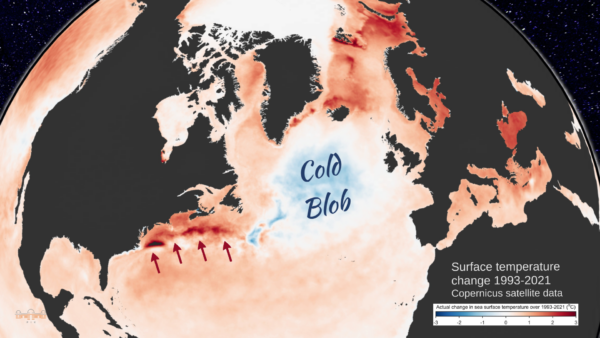
Here’s three questions about it.
1. Does the ‘cold blob’ work well as AMOC indicator?
We had tested that in the historic runs of 15 different CMIP5 climate models in Caesar et al. 2018 (our Fig. 5) and found it works very well, except for two outlier models which were known to not produce a realistic AMOC. Now Terhaar et al. redid this test with the new CMIP6 model generation und found it works less well, i.e. the uncertainty is larger (although for future simulations where the AMOC shows a significant decline in the models, our AMOC index also works well in their analysis).
Which raises the question: which models are better for this purpose: CMIP5 or CMIP6? One might think that newer models are better – but this does not seem to be the case for CMIP6. Irrespective of the AMOC, the CMIP6 models created substantial controversy when their results came out: the climate sensitivity of a subset of ‘hot models’ was far too high, these models did not reproduce past temperature evolution well (compared to observed data), and IPCC made the unprecedented move of not presenting future projections as straightforward model average plus/minus model spread, but instead used the new concept of “assessed global warming” where models are weighted according to how well they reproduce observational data.
In the North Atlantic, the historic runs of CMIP6 models on average do not reproduce the ‘cold blob’ despite this being such a striking feature of the observational data, as shown clearly in the Summary for Policy Makers of the IPCC AR6 (see Fig. 2 below). Of the 24 CMIP6 models, a full 23 underestimate the sea surface cooling in the ‘cold blob’. And most of the CMIP6 models even show a strengthening of the AMOC in the historic period, which past studies have shown to be linked to strong aerosol forcing in many of these models (e.g. Menary et al. 2020, Robson et al. 2022). The historic Northern Hemisphere temperature evolution in the models with a strong aerosol effect “is not consistent with observations” and they “simulate the wrong sign of subpolar North Atlantic surface salinity trends”, as Robson et al. write. Thus I consider CMIP6 models as less suited to test how well the ‘cold blob’ works as AMOC indicator than the CMIP5 models.
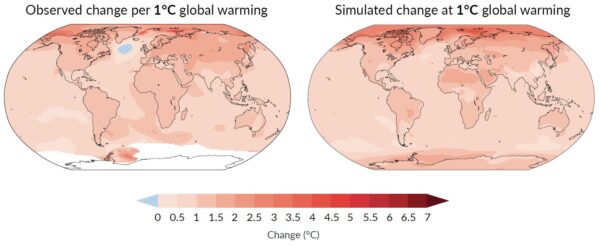
2. Is the new AMOC reconstruction method, based on the surface heat loss, better?
In the CMIP6 models it looks like that, and the link between AMOC heat transport and surface heat loss to the north makes physical sense. However, in the models the surface heat loss is perfectly known. In the real ocean that is not an observed quantity. It has to be taken from model simulations, the so-called reanalysis. While these simulations assimilate observational data, over most of the ocean surface these are basically sea surface temperatures, but surface heat loss depends also on air temperature, wind speed, humidity, radiation and cloud cover in complex ways, all of which are not accurately known. Therefore these surface heat loss data are much less accurate than sea surface temperature data and in my view not well suited to reconstruct the AMOC time evolution.
That is supported by the fact that two different reanalysis data sets were used, leading to quite different AMOC reconstructions. Also the AMOC time evolution they found differs from other reconstruction methods for the same time period (see point 3 below).
And there is another issue: we’ve previously looked at ERA5 surface heat flux trend, as shown here from my article in Oceanography 2024:
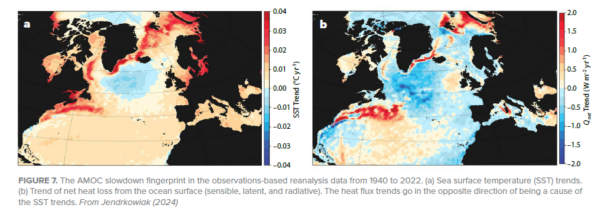
You see in both figures (in temperature as well as surface heat flux) the AMOC slowdown ‘fingerprint’ which includes both the ‘cold blob’ and a warming along the American coast due to a northward Gulf Stream shift, which is also a symptom of AMOC weakening. However, Terhaar et al. integrate over the whole northern Atlantic north of 26 °N so that the red area of increasing heat loss largely compensates for the blue area of decreasing heat loss. So in their analysis these two things cancel, while in the established concept of the ‘fingerprint’ (see Zhang 2008: Coherent surface-subsurface fingerprint of the Atlantic meridional overturning circulation) these two things both reinforce the evidence for an AMOC weakening.
3. How do these new reconstructions compare to others?
Here is how the Terhaar reconstructions (bottom two) compare:
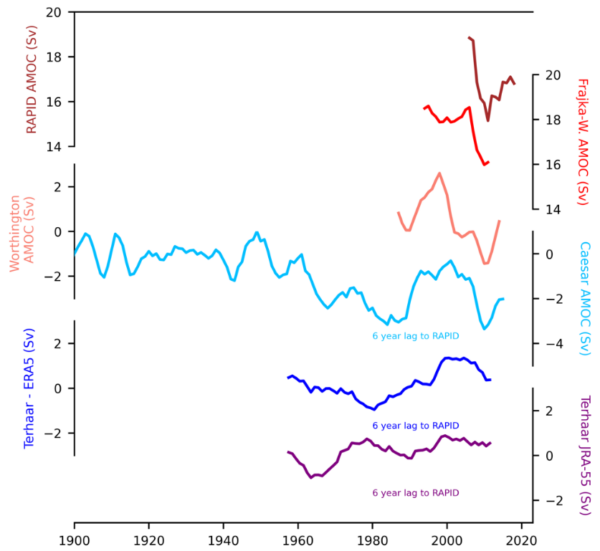
The reconstruction at the bottom using a reanalysis product from Japan doesn’t resemble anything, while the blue one using the European ERA5 reanalysis at least has the 1980s minimum and early 2000s maximum in common with other data, albeit with much smaller amplitude; it is a lot smoother. Thus it also misses the strong AMOC decline 2004-2010 and subsequent partial recovery seen in the RAPID measurements as well as the Caesar and Worthington reconstructions. A main reason for the lack of significant trend in the Terhaar reconstructions further is the time interval they used; for the same time span the Caesar reconstruction also does not show an even remotely significant trend (p-value is only 0.5), so in this respect our reconstructions actually agree for the period they overlap. The fact that ours shows a significant AMOC decline is because of the stable AMOC we find during 1900-1960, which is stronger than in the following sixty years. Here our reconstruction method shows its advantage in that reliable and accurate sea surface temperature data exist so far back in time.
Hence, I do not believe that the new attempt to reconstruct the AMOC is more reliable than earlier methods based on temperature or salinity patterns, on density changes in the ‘cold blob’ region, or on various paleoclimatic proxy data, which have concluded there is a weakening. But since we don’t have direct current measurements going far enough back in time, some uncertainty about that remains. The new study however does not change my assessment of AMOC weakening in any way.
And all agree that the AMOC will weaken in response to global warming in future and that this poses a serious risk, whether this weakening has already emerged from natural variability in the limited observational data we have, or not. Hence the open letter of 44 experts presented in October at the Arctic Circle Assembly (see video of my plenary presentation there), which says:
We, the undersigned, are scientists working in the field of climate research and feel it is urgent to draw the attention of the Nordic Council of Ministers to the serious risk of a major ocean circulation change in the Atlantic. A string of scientific studies in the past few years suggests that this risk has so far been greatly underestimated. Such an ocean circulation change would have devastating and irreversible impacts especially for Nordic countries, but also for other parts of the world.
Post script
Since I’m sometimes asked about that: last year a data study by Volkov et al. revised the slowing trend of the Florida current as well as the AMOC. Contrary to ‘climate skeptics’ claims, it has no impact on our long-term estimate of ~3 Sv slowing since 1950, i.e. -0.4 Sv/decade (Caesar et al. 2018). Both the original and the revised trend estimates for the RAPID section data (see Figure) suggest the recent AMOC weakening since 2004 is steeper than the long-term trend we estimated.
